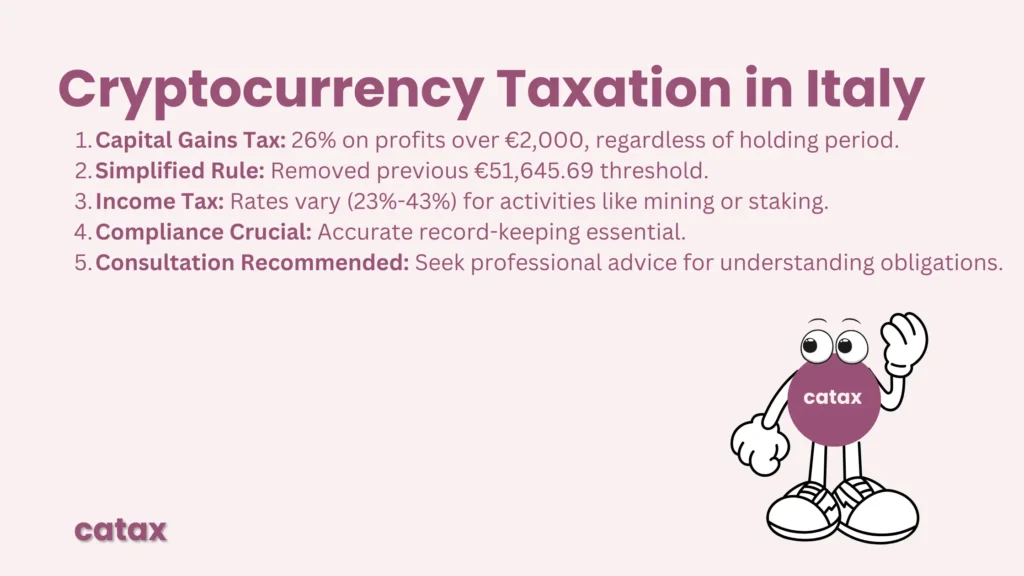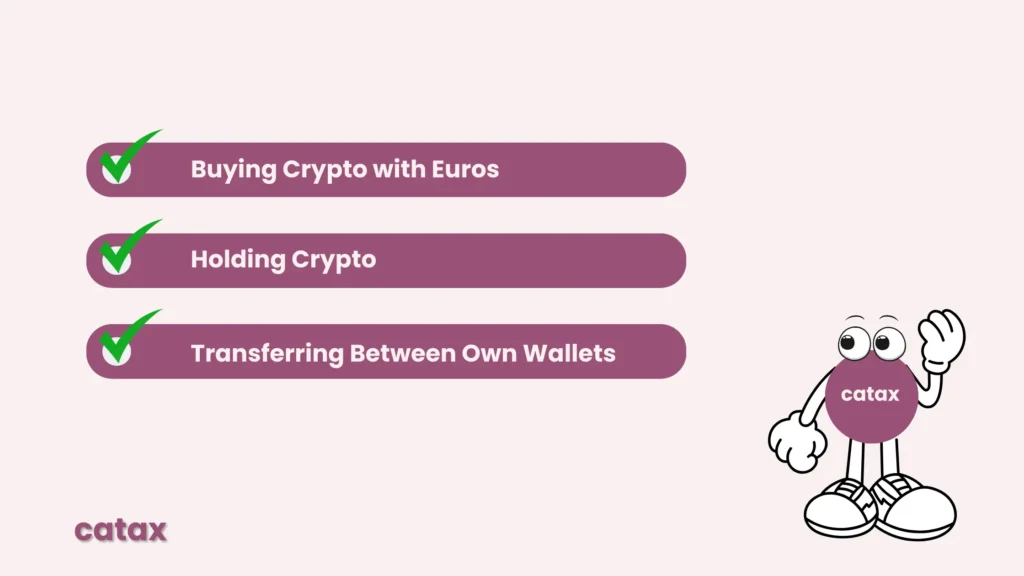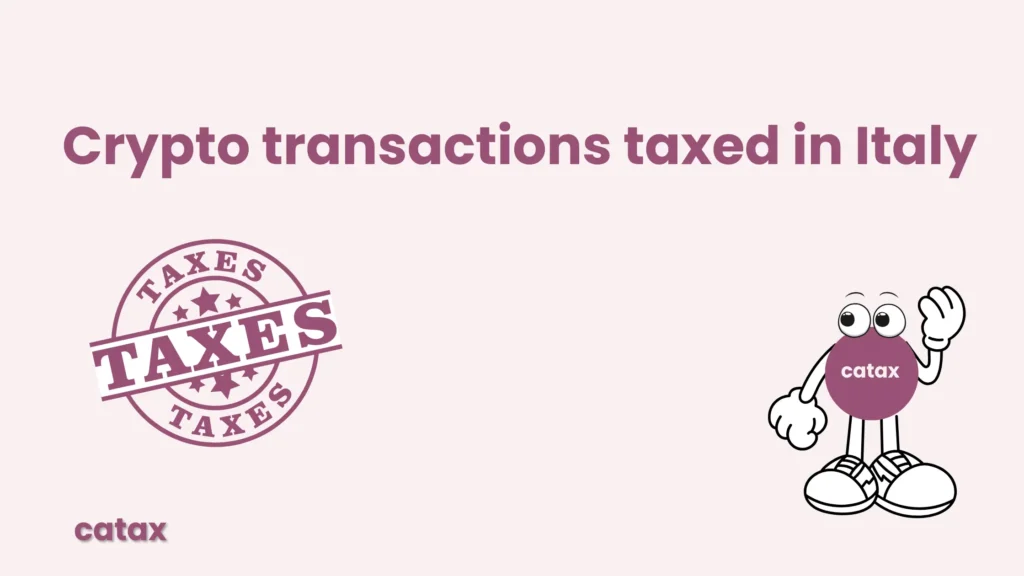This manual provides a comprehensive overview of the tax laws specific to Italy. Furthermore, it offers practical tips for effectively managing your cryptocurrency tax obligations. Moreover, it includes real-life examples to illustrate key concepts, making it easier for you to grasp the information. Consequently, this manual aims to empower you with the knowledge and tools needed to navigate the complex world of Binance taxes in Italy.
- Do you have to pay tax on Binance and crypto in Italy?
- What is the tax rate on Binance crypto earnings in Italy?
Can the Italian Revenue Agency (Agenzia delle Entrate) monitor cryptocurrency transactions, including those on Binance?- How should you handle tax reporting for Binance transactions in Italy?
- Guidance for Filing Binance Crypto Taxes in Italy: Choosing the Right Form and Deadlines
- Navigating Crypto Taxes in Italy for Binance Enthusiasts: A Friendly Guide
- Income Tax Slab Rate for Crypto in Italy
- Are Any Crypto Transactions Tax-Free in Italy?
- How are crypto transactions taxed in Italy, particularly on Binance?
- Spending crypto on goods or services
- Mining and staking rewards
- Defi investments
- Navigating Your Binance Taxes in Italy with Catax: Essential Steps
Do you have to pay tax on Binance and crypto in Italy?
In Italy, cryptocurrencies are subject to taxation, though specific regulations can be somewhat unclear as provided by the Italian Revenue Agency (Agenzia delle Entrate). Depending on the nature of your cryptocurrency transactions, you may need to pay either Capital Gains Tax or Income Tax. This means if you make a profit from buying and selling cryptocurrencies, or if you earn cryptocurrency as income, you are required to report this to the tax authorities and pay taxes accordingly. It’s important for individuals and businesses dealing with cryptocurrencies to understand their tax obligations to comply with Italian tax laws.

What is the tax rate on Binance crypto earnings in Italy?
The latest budget announcement has updated the tax rate applied to Binance crypto gains. Now, the government charges a 26% Capital Gains Tax on any profits exceeding €2,000 from cryptocurrency transactions. This is a change from the previous regulation, where the 26% tax rate was only applicable if the total value of your cryptocurrency holdings surpassed €51,645.69 for more than seven days in a row during the tax year. Additionally, if you earn income in the form of cryptocurrency, you are subject to Income Tax, which varies between 23% and 43%, depending on the total income you earn.

Can the Italian Revenue Agency (Agenzia delle Entrate) monitor cryptocurrency transactions, including those on Binance?
The Italian Revenue Agency, known as Agenzia delle Entrate, is capable of tracking cryptocurrency transactions. This is particularly relevant for users of platforms like Binance. Investors often choose cryptocurrencies for their privacy and decentralized nature. However, European Union directives require platforms like Binance to enforce “Know Your Customer” (KYC) policies. These policies diminish the anonymity of transactions by necessitating the collection of detailed user information. This step ensures compliance with tax laws and helps prevent money laundering activities.
The DAC8 directive aims to make tax rules in the European Union include cryptocurrencies. This step shows a growing effort to treat crypto transactions as taxable events. For those trading on Binance in Italy, it’s crucial to understand and fulfill tax duties properly. The Italian Revenue Agency highlights the need for keeping accurate records for tax reasons. Their push for greater openness shows they can track cryptocurrency transactions..
How should you handle tax reporting for Binance transactions in Italy?
Keeping track of your Binance taxes in Italy needs careful record-keeping, especially since the Italian tax office, Agenzia delle Entrate, hasn’t provided complete instructions yet. The changes in how crypto gains are taxed, announced in the 2023 budget. Show that Italy’s tax officials are paying more attention to crypto transactions. To be ready for any checks and to follow the rules, here are the important records you need to keep:
- Transaction Dates: Keep track of when each transaction occurred.
- Cryptocurrencies Involved: Note which cryptocurrencies were involved in each transaction.
- Type of Transaction: Document whether the transaction was a buy, sell, trade, or other type.
- Transaction Amounts: Record the quantities of crypto bought or sold.
- Transaction Value in EUR: Convert and record the value of your transactions into Euros.
- Gains or Losses: Calculate and document the gain or loss from each transaction.
The 2023 budget update requires crypto investors in Italy, including those using Binance, to pay a 26% tax on any gains exceeding €2,000 within the tax year. It’s crucial to prepare your records accordingly to report and pay taxes correctly on Binance and other crypto transactions.
Guidance for Filing Binance Crypto Taxes in Italy: Choosing the Right Form and Deadlines
For filing taxes on Binance transactions in Italy, taxpayers must select the appropriate form based on their income type, with each form having its filing deadline:
- Modello 730: This form is for individuals with employment income, credits, or deductions to declare. The deadline for filing the Modello 730 form is September 30th of the following tax year. For instance, if you’re reporting income for the 2023 tax year, you must submit the Modello 730 by September 30th, 2024.
- Modello Redditi Return: The Modello Redditi Return is for individuals reporting various types of income, including employment income, tax withheld, capital gains (with supplementary Form RT), or foreign income and assets (with supplementary Form RW). The deadline for filing the Modello Redditi, along with Form RT for capital gains, is November 30th of the following tax year. Using the same example, if you’re reporting for the 2023 tax year, you need to file the Modello Redditi (and Form RT) by November 30th, 2024.

Crypto investors, specifically those using Binance for their transactions, should focus on the Modello Redditi PF to report their gains. This ensures compliance with Italian tax laws and proper reporting of any capital gains derived from cryptocurrency transactions.
Navigating Crypto Taxes in Italy for Binance Enthusiasts: A Friendly Guide
Imagine you’ve dived into the world of cryptocurrencies through Binance, and you’ve made some smart moves. Let’s say you picked up some Ethereum when it was €10,000, and now it’s doubled to €20,000. Deciding to buy a car with that Ethereum? Well, in Italy, that’s a moment to pause and consider taxes. Essentially, you’ve just made €10,000 in profit, and the Italian tax office would like a piece of that pie, according to their rules on cryptocurrency gains.
Now, let’s chat about utility tokens. You might be dabbling or considering launching an ICO. The Italian Revenue Agency, kind of like a watchful guardian, hasn’t laid down specific rules for utility tokens yet. But the general vibe is: if you’re making money from these tokens, whether it’s through mining or providing services, think of it as regular income. It’s a bit like finding a treasure chest in your backyard and needing to tell the authorities about your newfound wealth.
Here’s a nutshell version for those navigating the crypto transactions via Binance in Italy:
- Crypto Spending: Buying stuff with crypto? That’s a taxable event. If your crypto has grown in value and you use it, you’re making a gain, and the tax folks will be interested.
- Utility Tokens: These are a bit of a grey area. But if you’re earning from them, treat it as income. Launching an ICO? Not directly taxable, but any income from related activities needs to be declared.
This guide is all about demystifying the process, making sure you can enjoy the crypto journey without any surprises from the tax department. Remember, it’s always a good idea to keep a detailed record of your transactions, just in case the taxman comes knocking!
Income Tax Slab Rate for Crypto in Italy
The income tax rate slab for cryptocurrency gains in Italy for the fiscal year 2024.
| Taxable Income (EUR) | Tax Rate (%) |
|---|---|
| Up to €15,000 | 23 |
| €15,001 to €28,000 | 25 |
| €28,001 to €50,000 | 35 |
| Over €50,000 | 43 |
Are Any Crypto Transactions Tax-Free in Italy?

While tax authorities are paying closer attention to cryptocurrency transactions, it’s important to note that not every crypto activity triggers a tax event. Specifically, there are certain situations where crypto transactions may be exempt from taxation:
Here are the key points regarding tax-free crypto transactions in Italy:
- Buying Crypto with Euros: Transactions involving the purchase of cryptocurrencies using euros are not subject to tax. This provides a tax-friendly entry point for investing in crypto.
- Holding Crypto: Simply holding onto your cryptocurrencies, without selling or trading, does not trigger a taxable event. Investors can benefit from potential market appreciation tax-free.
- Transferring Between Own Wallets: Moving your crypto assets between wallets you own, such as from a trading platform to a personal hardware wallet, is tax-exempt. This allows for secure asset management without incurring taxes.

How are crypto transactions taxed in Italy, particularly on Binance?
These are some crypto transactions taxed in Italy.

Selling crypto for euros
When you sell your cryptocurrency for euros, you’re essentially disposing of an asset. Any profit you make from this transaction is subject to Capital Gains Tax at a fixed rate of 26%. This tax applies regardless of the amount you’ve gained from the sale.
Trading crypto for crypto
Trading one type of cryptocurrency for another is also considered a disposal of an asset. This means that any gain you realize from such trades is subject to the same 26% Capital Gains Tax rate. It’s important to note that even though you’re not converting your crypto into fiat currency, the tax obligation remains the same.
Spending crypto on goods or services
Mining and staking rewards
While the Italian tax agency hasn’t provided specific guidance on taxing mining and staking rewards, taxpayers generally understand that they should treat these rewards as additional income. Additionally, this means you may be liable to pay Income Tax based on the fair market value of the tokens received at the time of receipt. Consequently, it’s advisable to consult with a crypto-savvy accountant to ensure compliance with tax obligations.
Defi investments
Decentralized Finance (DeFi) investments introduce complexities in taxation due to the variety of protocols and transactions involved. Tax implications can vary widely depending on how your DeFi investments operate. Given the intricate nature of DeFi, seeking advice from a knowledgeable accountant is crucial to understanding your tax liabilities accurately.
Gifting crypto
In Italy, it’s not clear how giving crypto as a gift affects taxes, because the tax office hasn’t given specific advice yet. Italy does have rules for taxes on gifts and inheritance, but it’s not sure if these rules apply to cryptocurrencies like Bitcoin or Ethereum. The situation could affect both the person giving the gift and the one receiving it. It’s a good idea to talk to an accountant who knows about crypto to understand what taxes might be involved when you give crypto as a gift.
Navigating Your Binance Taxes in Italy with Catax: Essential Steps
- Connect Catax and Binance Accounts: Begin by linking your Binance and Catax accounts to ensure seamless integration. Generate API keys on Binance for secure data sharing, allowing Catax to access your transaction history accurately.
- Import Your Transactions: Once linked, Catax will automatically import your full transaction history from Binance, covering trades, deposits, and withdrawals. It’s crucial to review this imported data for completeness and accuracy.
- Review Transactions Carefully: Scrutinize the detailed transaction data compiled by Catax. Identifying and addressing any discrepancies early on is key to ensuring the accuracy of your tax filings.
- Select the Correct Tax Year: In Italy, the tax year aligns with the calendar year, starting on January 1st and ending on December 31st. Make sure to select the appropriate tax year for your report to comply with the Italian Revenue Agency’s (Agenzia delle Entrate) requirements.
- Generate Your Tax Report: Utilize Catax to calculate and compile a detailed tax report tailored to your activities. This report will include an itemized account of your capital gains and losses, income from cryptocurrency transactions, and any relevant deductions, providing a clear overview of your tax obligations.
- Thoroughly Review Your Report: Before proceeding, meticulously review your Catax-generated tax report for any potential errors. Accurate reporting is crucial to avoid issues with the Italian Revenue Agency.
- Submit to the Agenzia delle Entrate: Finalize your tax report and submit it as part of your tax return to the Agenzia delle Entrate, adhering to their submission deadlines to avoid penalties. The deadline for online submissions typically falls on November 30th for the previous fiscal year, but it’s always best to confirm the current year’s deadline.

FAQs (Frequently Asked Questions)
Absolutely, using crypto to purchase goods or services is seen as disposing of an asset, with any gains taxed at 26%. It’s similar to selling your crypto for cash in the eyes of the tax authorities.
Mining and staking rewards are generally considered additional income, taxed based on their value at the time you receive them. Since specific guidance is scarce, consulting with a tax professional is wise.
DeFi investments can be complex tax-wise, with the tax implications varying greatly. Due to the intricacies involved, getting advice from a tax expert familiar with DeFi is essential.
The tax situation for gifting crypto in Italy is a bit murky, as there’s no clear guidance. However, inheritance and gift tax laws might apply, making it a good idea to speak with an accountant to understand any potential tax implication



